In this part of the interview the Iranian American socialist and feminist, translator and writer Frieda Afary speaks about the most recent feminist and anti-authoritarian uprising in the country as well as the Russian invasion of Ukraine and the challenges for the global progressive movements.
In the first part of this interview, published earlier, Frieda gives an extensive historical and structural explanation of how Islamic fundamentalists came into power in Iran, including a critical evaluation of the role which Iranian leftists played in this by being focused exclusively on opposing Western imperialism.
What is the relation between feminist, political and socio-economic demands in the most recent wave of protests?
There is so much anger not only among women against the mandatory hijab, but also on the part of the large majority of the population as a whole who no longer think the hijab should be mandatory. People are also angry because of the economic crisis and the starvation they have been facing, not being able to provide their families with enough food, enough clothing, housing and health care. There is state discrimination against national minorities such as Kurds, Arabs, Baluchis. Mahsa Amini was a Kurdish woman and she became the symbol of the dissatisfaction, and suffering of women in Iran in the past 40+ years. In 2022, there were protests in Tehran, Kurdistan and throughout the country in opposition to the forced hijab. People did not only demand an end to the compulsory hijab. They were also demanding an end to the Islamic Republic, an end to state and police brutality, and arrests, an end to gender violence, repression and tyranny.
The people participating in this current movement are very young. The majority of the protesters in the “Woman, Life, Freedom” movement have been between the ages of 15 and 19. We are talking about high school students and college students and many unemployed young women and men. That’s one very important factor: these are young people. The other really important factor is that these are young people who are connected to the world through the internet, and who have certain expectations about their future that are not being met.
The most recent protests were not only about women’s rights and against conservative dictatorship, but also raised the question of ethnic minorities’ rights. Could you tell more about this?
Mahsa Zhina Amini was Kurdish, which highlights the fact that Kurds are a national minority that have been denied their rights. National minorities in Iran also include Arabs in the southern part of the country and the Baluch in the south-eastern part of Iran bordering Pakistan. We also have the Turkmen, and the Azeris. Of all the national minorities that I’ve mentioned, Azeris are more well integrated into the system. There have been quite a few very influential Azeris in Iranian history and within the Islamic Republic. When it comes to national minorities, very basic rights have been denied, such as the right to use their language as the language of instruction and as the language of administration, the right to have control over the resources in the areas where they live – how they are used, what is the environmental impact, what happens with the profit. These are the main demands: they want respect for their culture, the right to speak their language, the right to control their resources, and the right to not be discriminated against. They are not demanding separation, but they do want a federalist system that would allow for some level of autonomy in their regions.
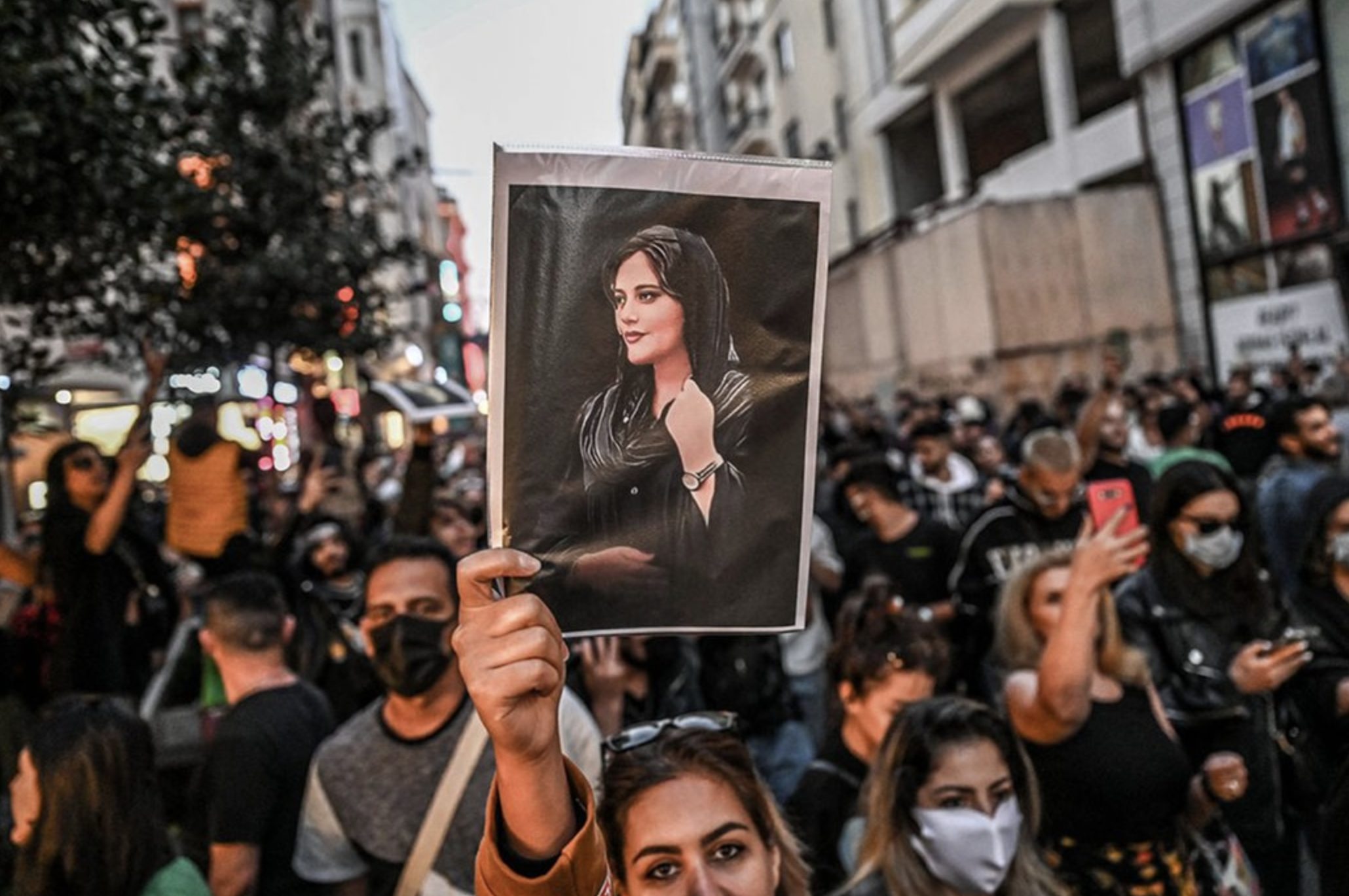
Protester holds a photo of the dead Mahsa Amini during a demonstration in Iran, 2022. Photo: Ozan Kose/AFP
One of the issues that's brought up against autonomy, is that the region where most Kurds live in the northwest also has a lot of Azeris, and there have been conflicts between the Kurds and the Azeris. For instance, it is said that if there's federalism, how would you deal with the conflict between the Kurds and the Azeris? But I think the Kurds and Azeris have argued that these are issues that can be resolved, because the main issue is that they want respect, they want their languages to be developed, and they want equitable control of resources.
How strong is the nationalist element (Kurdish, Sunni/Baluch) in the 2022-2023 protests? Resistance of Ukrainian society has often been dismissed by some representatives of the global left as containing many right-wing and conservative elements. Are there such elements in the Iranian resistance?
There are different tendencies within the Iranian Kurdish parties, some of which have formed alliances with other powers in the region. However, the progressive element and the desire for a viable federalist system in Iran is very strong within Iranian Kurds. The conservative and misogynist elements within the Baluchi leadership have been strongly criticized by the Baluchi feminist organization, Dasgoharan. There are also some conservative nationalist elements within the Azeri and Arab population. However, for the most part, the majority of Iran’s national minorities are not interested in separatism.
We do have very strong Persian nationalism in Iran. For instance, there was an effort by Reza Pahlavi, the son of the deposed king Mohammad Reza Pahlavi, to create an alliance and pose himself as the alternative to come into power. He was able to get support from Shirin Ebadi, the Iranian feminist who won the Nobel Prize in 2004. He also received support from a Kurdish leader who represents one of the Kurdish political parties, and from a well-known activist from the organization of families of people killed on the Ukrainian plane that was shot down by the Islamic Republic in 2020. However, it seems that Reza Pahlavi’s alliance is breaking up because of its authoritarian practices.
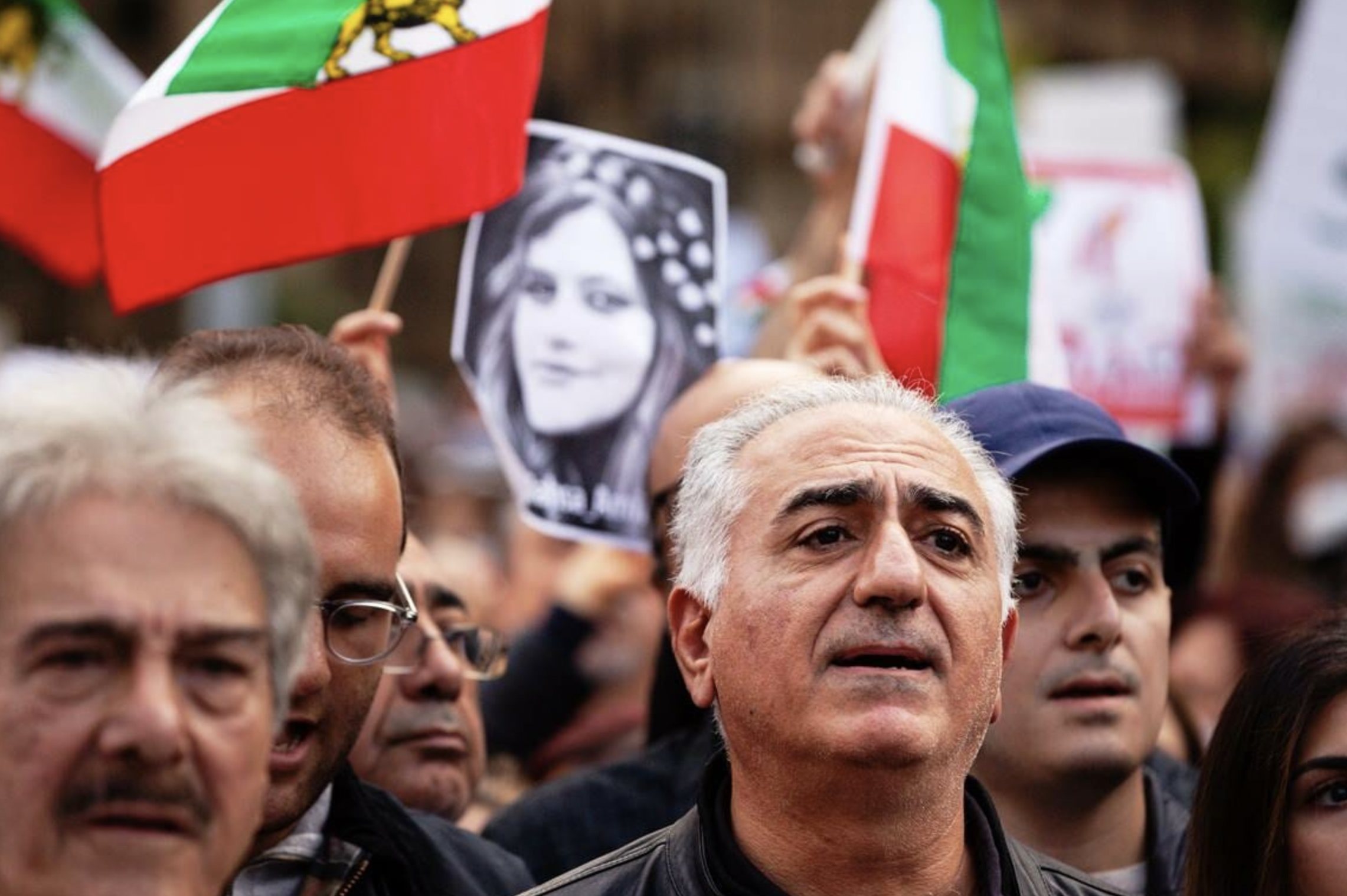
Reza Pahlavi farewelling Mahsa Amini in Washington, DC, September 24, 2022. Photo: Allison Bailey/SOPA Images/Shutterstock
We also have the Iranian nationalism of the Iranian intellectuals who are not monarchists, but want a unified Iran. They are very strongly focused on promoting Persian culture/language and against the idea of promoting various languages. They say that this will lead to separatism. They are a very strong element in Iranian society, not to be discounted.
Then there is of course the Islamic Republic itself, which has the capacity for possibly shedding its religious fundamentalist aspect and making itself a secular authoritarian state like that of the Assad regime in Syria. That's another possibility, and that would also be very much based on Persian/Shi’i nationalism. These are all really dangerous possibilities.
Do these nationalistic elements in Iranian society and protests have any influence on the solidarity from the global feminist and leftist movements? Are there people in other countries, who say that they cannot support the protests in Iran because there are nationalists in the Iranian movement?
That's a very good question. Luckily, there are a lot of efforts by Iranian activists to really focus on the fact that they are against Western imperialism, and for labor rights, and for women's rights. That is why that element of right-wing nationalism, even though it's there and it's very dangerous, still is not being used by the Western left to bash the Iranian movement at the moment.
What do you perceive as the main threats to the progressive movement in Iran now? Are there threats inside the movement dynamics?
I think external threats are definitely huge: the government itself and its repressive machine which is very powerful, and it gets support from Russia and China. Putin had even offered to send troops to Iran shortly after the “Woman, Life, Freedom” movement arose in the fall of 2022. And I wonder if China is going to send troops to Iran to defend the government? Will Russia send troops to Iran at some stage? That's a really major concern, not to mention the military power of the regime itself.
Internally, I think that the Iranian nationalism of the monarchists and the secular nationalists is a threat. Secular nationalists, I would say, are even more of a threat than the monarchists.
If there's no recognition of the rights of the national minorities, no alternative system that considers the rights of all and especially of women and environmental concerns within each national identity, there could be fighting between the various regions of the country.
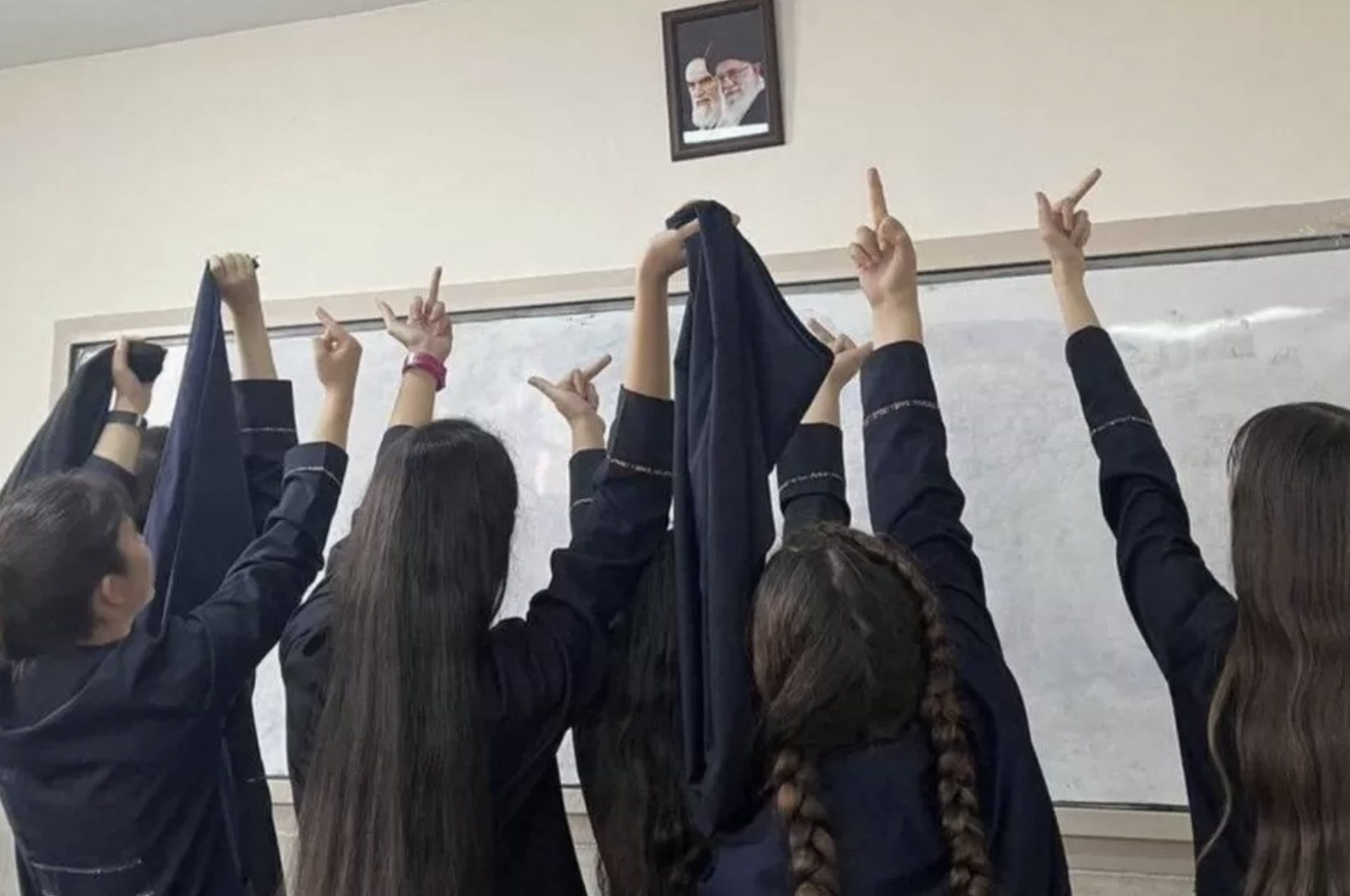
Iranian schoolgirls also joined the protests, 2022. Photo: from open sources
What is the positive program of the Iranian resistance? Which points are negotiated there and what is the course of its development in general?
I tried to summarize the positive vision that has been outlined by Iranian feminist activists in the past few months in my article “This International Women’s Day, Iranian Feminists Are at the Front Lines”. It is based on the Statement of Minimum Demands of Independent Iranian Unions and Civil Society Organizations. This statement was issued on February 14, and was endorsed by major progressive, labor, women's rights and some national minority groups in the country. The statement said:
“The foundational protests that have upsurged today by women, university and high school students, teachers, workers, justice-seekers, artists, queers, writers and the majority of the oppressed people of Iran, in place after place, from Kurdistan to Sistan and Baluchistan provinces have attracted an unprecedented level of international support. These are protests that raise a banner of opposition to misogyny, gender discrimination, endless economic insecurity, enslavement of the labor force, poverty, misery, class oppression and oppression on the basis of nationality and religion. This is a revolution against any form of religious or secular dictatorship imposed on us, the majority of the Iranian people, during the past century.”
The statement called for “the immediate declaration of the complete equality of the rights of women and men in all political, economic, social, cultural and familial arenas. The unconditional repeal of all discriminatory laws against sexual and gender identities and orientations. The recognition of the rainbow ‘LGBTQ+’ community. Decriminalizing all gender identities and orientations. Unconditional adherence to women’s rights to control their own body and future and preventing the enforcement of patriarchal control.”
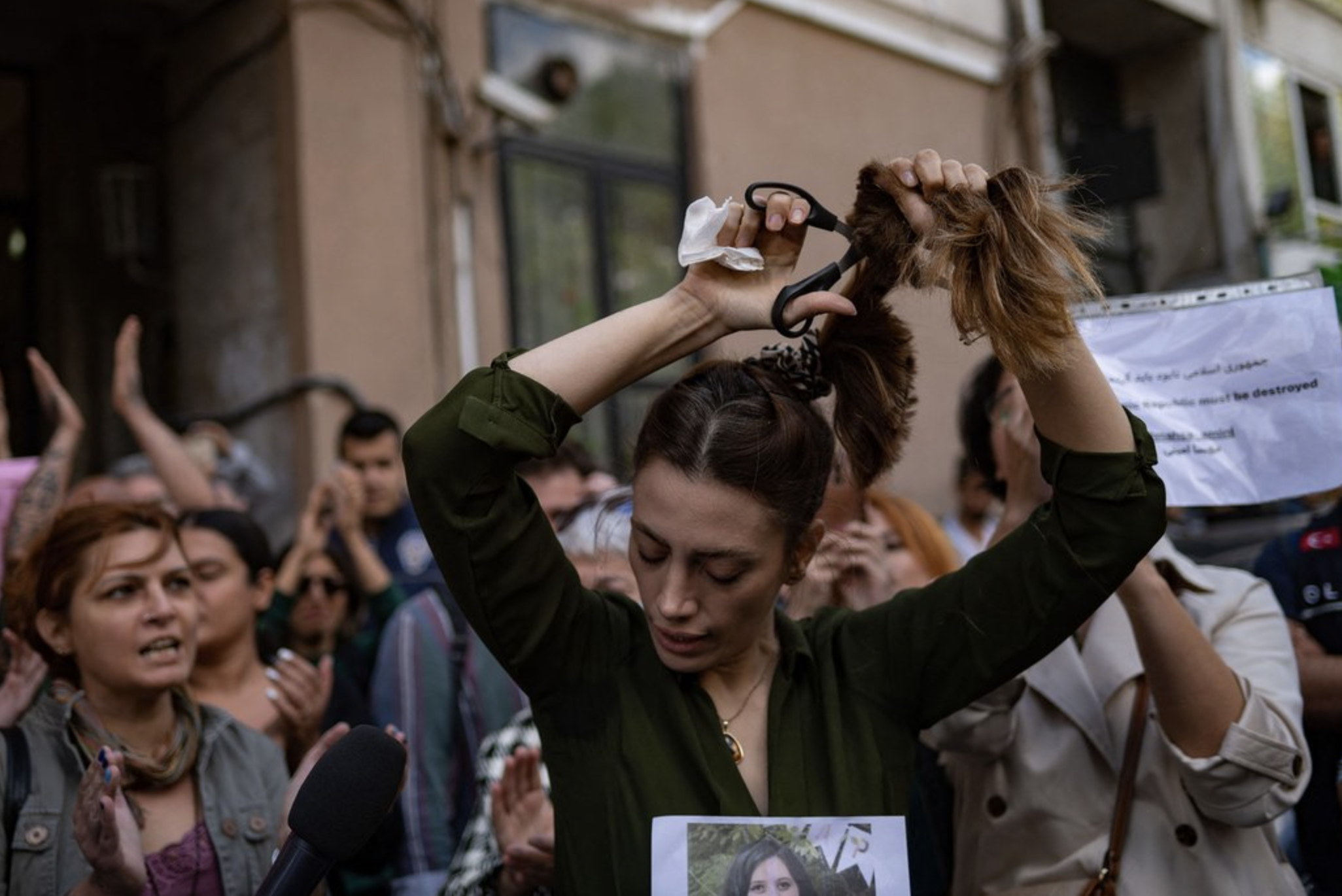
Nasibeh Samsai, an Iranian woman living in Turkey, cuts off her hair during a protest outside the Iranian consulate in Istanbul on September 21, 2022. Photo: Yasin AKGUL/AFP/Getty Images
Subsequently, a group of Iranian women's rights activists inside Iran, most of whom were also involved in issuing the previous statement, issued a statement for International Women's Day in which they emphasized that gender discrimination is rooted in the continuation of capitalist patriarchy. They have also affirmed many of the demands raised by the statement of minimum demands and also state that the current movement has gone beyond demanding anything from the government. They challenge all institutions of power whether it is the Islamic Republic or monarchy. They also pursue radical and structural changes, including the right to choose one's attire, living wages, complete reproductive and abortion rights, free education, free health care, and care for the elderly and people with disabilities.
Based on these statements, I would say that if this movement succeeds with these activists in its leadership, it can be amazing. But the problem is that the people and organizations which issued these statements have not articulated by which means this will happen. And that's something that I'm sure they're working on right now in Iran, because they have to do it underground and so we don't know all the details. But clearly, it cannot be done unless the Iranian activists also actively reach out in solidarity to countries where Iran is intervening militarily and politically. That includes Ukraine, Syria, Lebanon, Iraq, Yemen, and Afghanistan. Iranian feminist leader Nasrin Sotoudehdid issue a statement of solidarity with Ukrainians in March of 2022, right after Russia launched its full scale invasion.
These demands sound like a big leap forward to Iranian society. To which extent are these supported en masse even inside this mass mobilization, which was quite messy and very diverse? To which extent the statement on the LGBTIQ+ rights is supported by the general public or at least the supporters of the movement?
I think there’s definitely more openness to it, especially among the young generation. But the extent to which the society as a whole would back actual legal rights for the LGBTIQ+ community – I myself don't know. But I think the fact that some labor organizations endorsed the statement is very important, and some of the signatory organizations represent very deep layers of society. I was told that the bus workers union at first did not agree to endorse the statement in February, but then a few months later they changed their mind. And that's a very good sign! Those who had signed the statement of February 14, 2023, were not just a bunch of intellectuals. Iranian society is really experiencing some major transformations at the grassroots level which is quite inspiring. We'll see. I'm hopeful but I am also quite cautious.
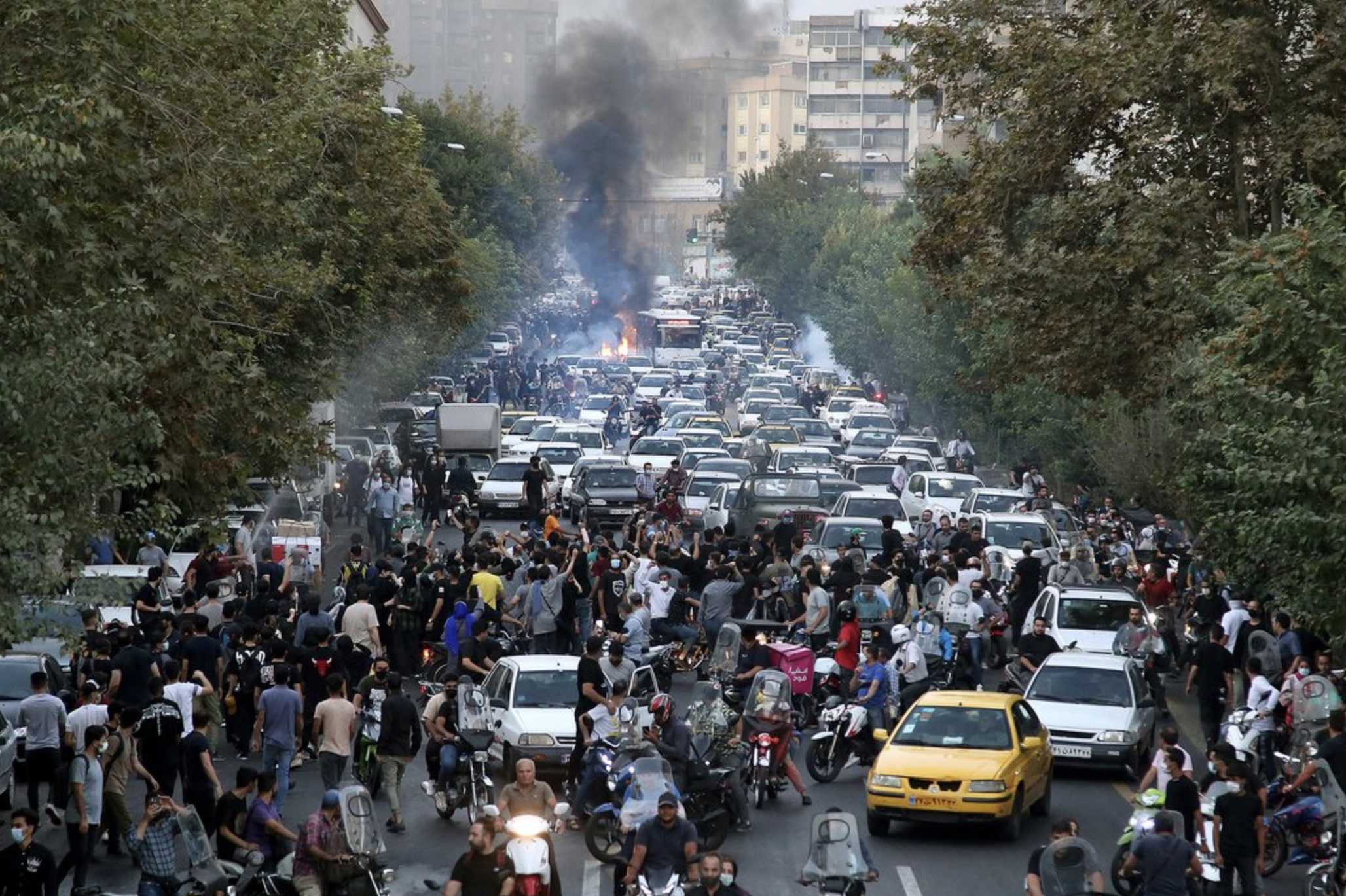
Mass protest in Tehran, Iran on September 21, 2022. Photo: AP Photo
The Islamic fundamentalist regime and its oppression of women has been often framed as something of “orientalist”, “religious” and “unmodern” nature, opposed to the “western”, “secular” and “modern” presumably progressive societies. What is the political role of this dichotomy, whether and how the progressive movements should overcome it?
What is happening in the West with the assault on women's rights and reproductive and abortion rights, really shows that we can't say that the West is about women's rights and the East is about women's oppression. We're seeing an unbelievable level of retrogression when it comes to gender rights in the West itself. Also let us not forget that in August 2021, US imperialism made a deal with the Taliban after 20 years of occupation of Afghanistan, and handed power back to them, which shows how little the US government cares about women's rights.
Now it is women in Iran who are leading the cause of feminism while most feminists in the US are only calling for voting for Democrats and changing the composition of state legislatures, a defensive response which is necessary on the immediate level to maintain the rights we have, but completely insufficient and does not address the relationship between patriarchy and capitalism and racism. Black feminists in the U.S.are the most forward looking. They have created the reproductive justice movement that calls for not only the right to choose, but the right to a dignified existence, which includes healthcare and education, and housing. Black feminists in the U.S. are also among the leaders and thinkers of the prison abolitionist movement.
Instead of talking about the dichotomy of West vs. East, we need to talk about how there is an assault on gender progress globally and that is one of the features of 21st-century capitalist authoritarianism.
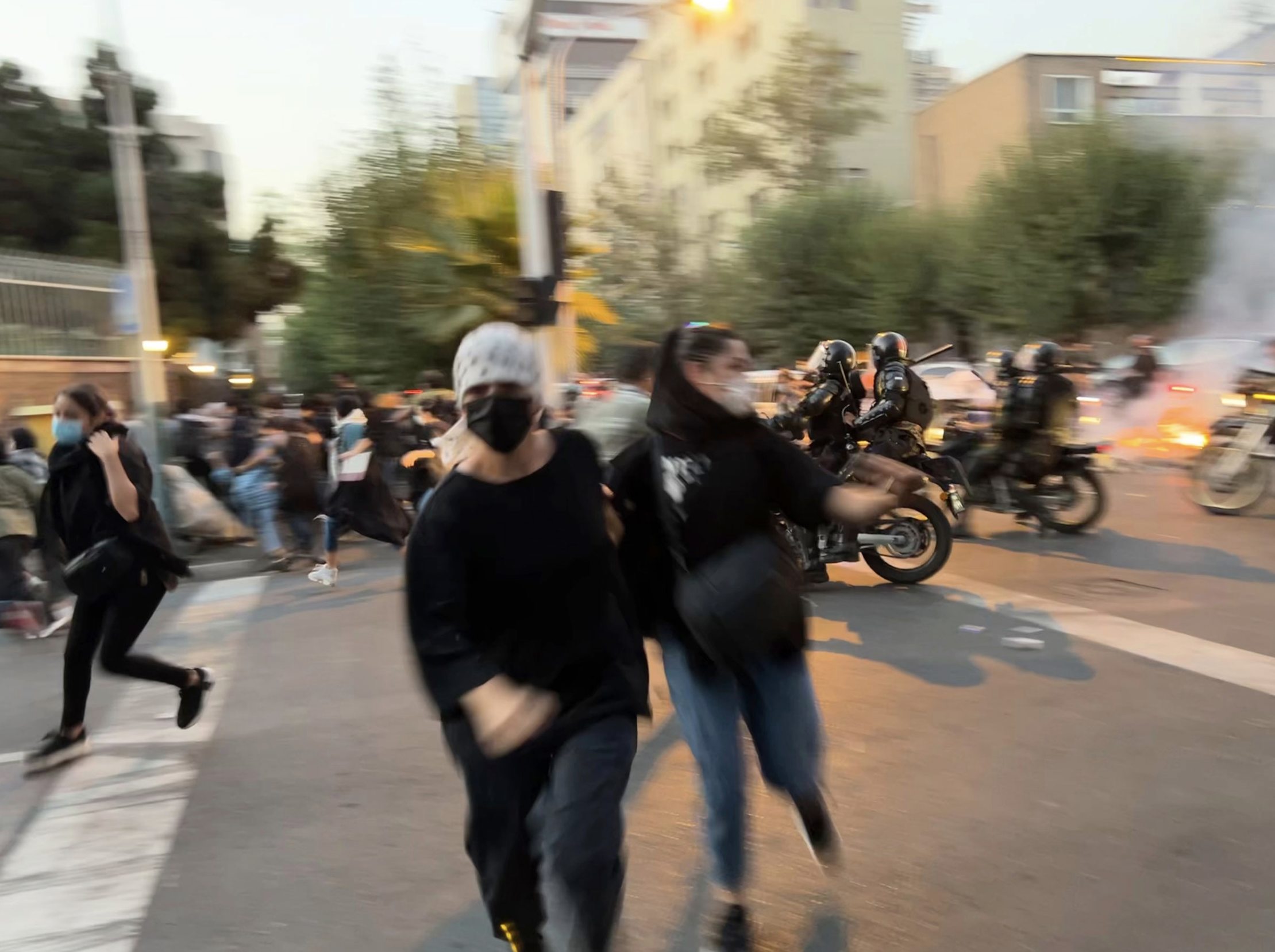
Women run from police during a protest in central Tehran, Iran, on September 19, 2022. Photo: AP Photo
With recent direct offense on womens’ rights in many parts of the world, this civilizational dichotomy may be challenged and rather turned into a continuum of oppressions, caused by related factors. Do you agree that the roots of these very different levels and systems of oppressions are related? Or are there some distinctive factors, rooted in religion (either Islamic or Christian, or Jewish or Hindu fundamentalism), which contribute to the most oppressive systems?
I would say both: We suffer from related systems of oppression — capitalism, patriarchy, racism – and we also have distinctive factors in each country related to religion and culture, and historical developments, which make us experience these related symptoms of oppression sometimes in different ways.
During the past few years we have seen uprisings against authoritarianism with women being in the forefront or very actively involved whether in Iran or Ukraine, Myanmar or Sudan, or Black Lives Matter in the US. We have seen the rise of the MeToo movement challenging sexual violence. The MeToo movement has shown that even under advanced capitalism, even the most successful women are not free of sexual violence. Yet the organizing effort of the MeToo movement has not gone beyond exposes of individuals or advocating care for individual survivors. I think that if the MeToo movement wants to follow through on this challenge, it needs to address the mass rapes in Ukraine, or the Taliban's mass killing of women in Afghanistan, or the mass rapes of women in Sudan. This is really where the MeToo movement should be. Otherwise we're only staying at the level of individual cases.
In the countries of Global South, Russia is often perceived through the prism of the USSR's support for the anticolonial movements. It is often ignored or devalued, that Russia is not the USSR, that Ukraine was part of the USSR too and that there is a radical difference between the USSR and Putin’s Russia. Russian and Soviet imperialism is often ignored. But Iran has its own history of experiencing Russian imperialism – at the beginning of the 20th century Great Britain and the Russian empire divided Iran according to their spheres of influence. During WW2 the USSR and Great Britain occupied Iran and the USSR was trying to have oil concessions after the war. How (if) is this history remembered and reflected in contemporary Iran? How are the USSR and Russia perceived by society in general and by the progressive movements?
Russia is not remembered kindly. As you mentioned, in the 19th century we had the Turkmenchaii and Gulistan treaties through which Russia took some of the lands that are currently considered Caucasus and Central Asia and were part of Iran at the time. Then during the 1906-11 Iranian constitutional revolution, Russia had a very counter-revolutionary role: They bombed the Iranian Parliament and executed some of the leaders who represented the constitutional movement and wanted to create reforms. The USSR-backed Tudeh Party had a very strong impact on Iranian intellectuals for many years. Many Iranian intellectuals were sympathetic to Stalinism and later also Maoism.
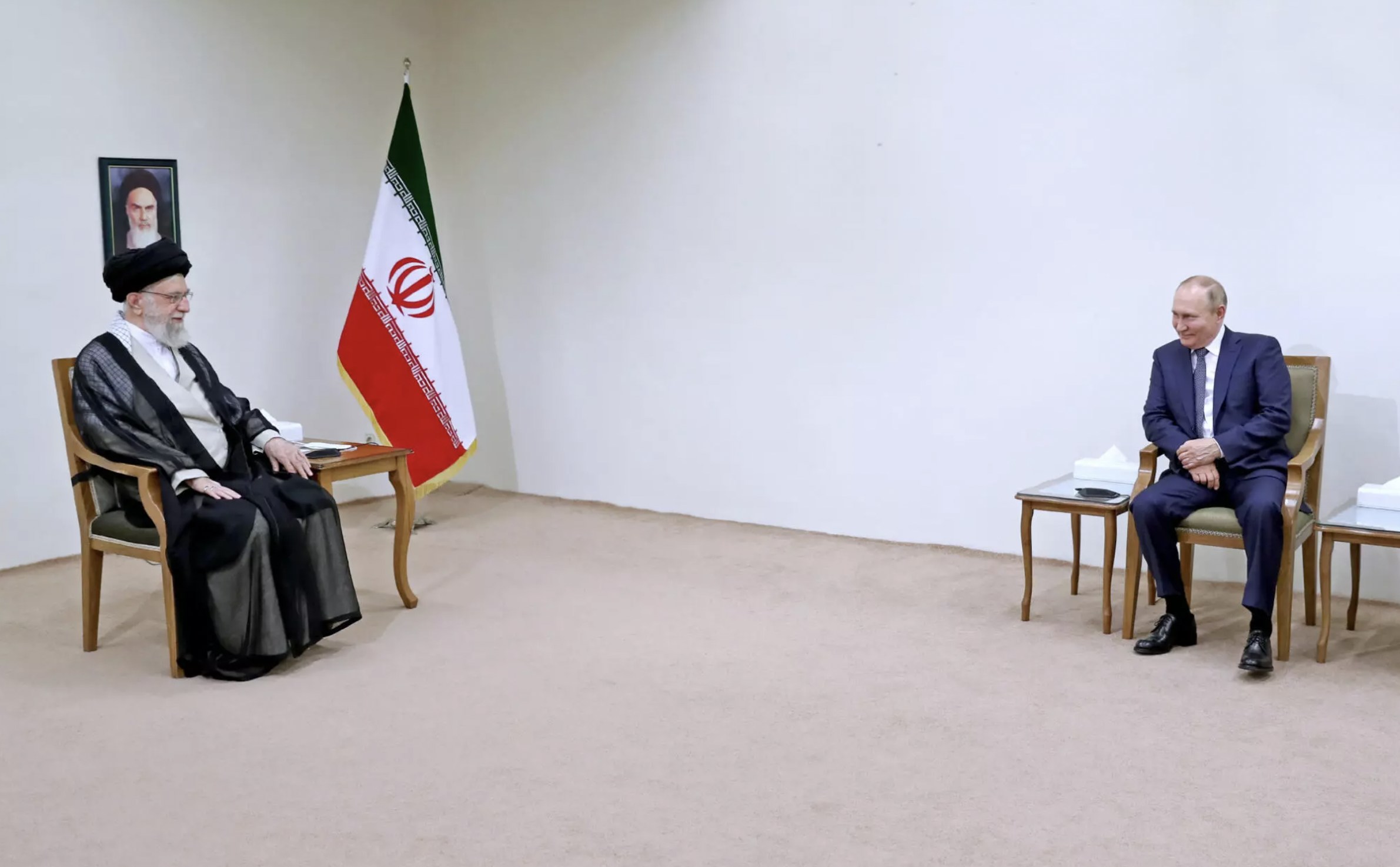
The meeting of Vladimir Putin and Ayatollah Ali Khamenei, Tehran, July 19, 2022. Photo: AP Photo
As I mentioned earlier, this Stalinist legacy had terrible consequences for Iran because during the Revolution the majority of the leftist intellectuals were saying that the main enemy was US imperialism so we should be softer on the Islamic fundamentalism. Of course, we saw what that led to. The Tudeh Party advocated support for the Islamists even until 1983, when their leaders were arrested and some were executed. Russia has been selling arms and nuclear plants to Iran for the past 30-some years. Even under the Shah, there were some relationships. However, with the Islamic Republic, Russia has been a major ally. Iran is now selling drones and missiles to Russia to bomb Ukraine, and it is building a drone factory near Moscow. All of these issues make Iran's relationship with Russia a really important topic.
When it comes to the majority of the Iranian public, there is quite a bit of hatred for Russia and Putin, and there is support for Ukrainians. When it comes to the Iranian left, unfortunately, many of them still fall for the view that the war in Ukraine was started by NATO and that if they support the Ukrainian struggle for self-determination, it would be equivalent to defending NATO. But again, this is not the monolithic view. Some months ago, three leftists were interviewed by the editor of the Iranian leftist website, Critique of Political Economy. One of them, Kamran Matin, a Kurdish intellectual, strongly supported the Ukrainian struggle for self-determination and completely challenged the narrative that the war was started by NATO and that if we support Ukraine it would be equivalent to being uncritical of NATO. The other two, Saeed Rahnema and Yassamine Mather, however, had a different view.
The 2014 Ukrainian Maidan uprising was followed up by Russia’s annexation of Crimea and by the war starting in the Eastern part of the country, and with a quite predatory neoliberal policy promoted by the new Ukrainian government. This made some sections of the left movement in the post-Soviet space follow the idea that this kind of popular uprising against authoritarian rule is not good and we should keep away from them. In the case of Belarus, for example, when they had a huge protest in the summer of 2020, part of the post-Soviet left were saying: we cannot support that because it will lead to neoliberalism and war. Is there something like that in terms of the Arab Spring? How is it reflected in the region by the left or some sections of the left? Is there a ghost of the Arab Spring?
In Iran for the last few years, many intellectuals were saying: Oh, if we start a movement and call for an end to the Islamic Republic instead of going through reforms, it will just bring about mayhem and another failed Arab Spring. But in the end, young people who started the “Woman, Life, Freedom" movement were not afraid and said “No, we want a revolution. Reforms are not enough”. So I don't think that the experience of the Arab Spring will stop people from wanting revolutionary transformation. But what I'm concerned about is that the intellectuals are really not doing their work. It is not enough to write books and write articles. We have to talk about the connection between liberatory ideas and organizational form and content, and about having organizations in which people learn to become critical thinkers. That to me is the most important responsibility of intellectuals.
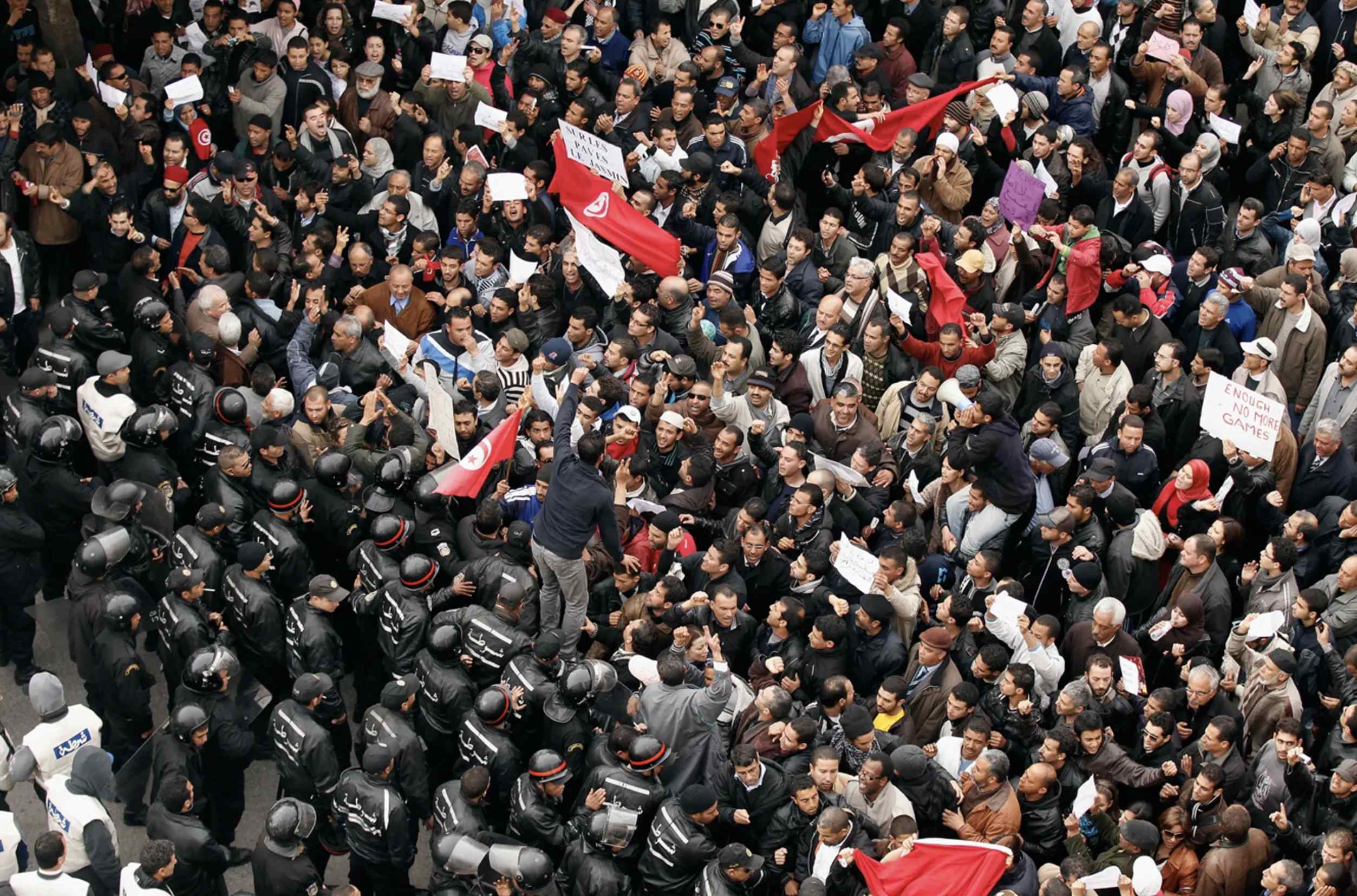
Policemen stop protesters on the streets of the capital of Tunisia, January 20, 2011 (Arab Spring). Photo: Christopher Furlong/Getty Images
What do you think about the dynamic of the global progressive, left, feminist movement in the course of the recent decades and especially now, facing the extremely challenging global developments?
I'm quite concerned. After the collapse of the Soviet Union there was so much hope that we would see the collapse of the Stalinist and Maoist left and the rise of a serious and thoughtful social left globally. In some places, there have been some important efforts, but I think for the most part that didn't happen. It's not only that the Western left is mostly focused on being anti-US imperialism. It also seems that in general, those who are part of the Left, mostly cannot stay independent of all poles of capital. They get sucked into one pole or another.
Many people had a lot of hopes for the Arab Spring, but it turned into a disaster, partly because of internal sexism and discrimination against minorities and partly because of the reduction of anti-capitalism to being simply against Wall Street or being simply the advocacy of a form of state capitalism. We saw the Arab Spring collapse also because the Syrian uprising did not receive the support that it needed to fight the brutal Assad regime. Again, this narrative of “anti-US imperialism” made many on the left support the Assad regime.
When it comes to women and feminism, I still have a lot of hope because of the uprisings that we've seen emerge during the past few years, including Ukraine, Iran, Sudan, and Myanmar. They all have women actively involved, and in some cases in the forefront. That is really significant. But feminism too has not been immune to the pull of the poles of capital. In my writing and activism I’m trying to bring together those feminists who want to really take responsibility for the challenges that face us, trying to do the philosophical and organizational work to develop an alternative. I have to have hope for this, because otherwise I just don't see us getting anywhere.



